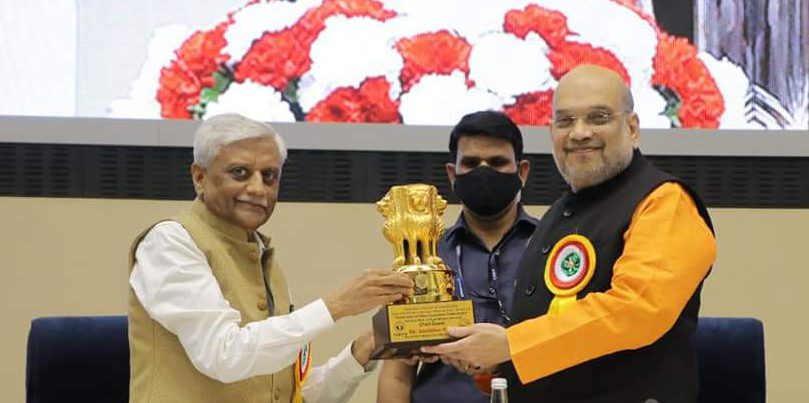By Jyotindra Mehta,
NAFCUB President
Hon’ble PM had rightly envisioned that cooperation is the best way to involve the bottom half of our population in India’s growth story and it needed an exclusive Ministry of Cooperation to actualize his vision. The Country is thankful to the PM for announcing his vision of “SAHKAR SE SAMRIDHI”. He elevated the vehicle of cooperation to all India canvas by boldly creating a separate ministry at the Centre for Cooperation. He entrusted the reins of the Ministry to Sh. Amit Shah to actualize his vision of bringing prosperity through cooperation.
“Sh. Amit Shah, amply is justifying the trust reposed on him by the Hon’ble Prime Minister in entrusting him the charge of first Cooperation Ministry of independent India by setting up a cracking pace for the Ministry”, says Jyotindra Mehta, President NAFCUB. He added,”Sh. Amit Shah has hands-on experience of running cooperatives including turning around a DCCB.He has deep knowledge of the strengths and weaknesses of the cooperative banking sector both rural and urban sectors. Right from early 2022, he has motivated and encouraged the officials of the new Ministry of Cooperation to have extensive and frequent interactions with the representatives of National Federation of Urban Cooperative Banks and Credit Societies (NAFCUB) to get the feel of the issues of the UCB sector. For the first time under his watch, a working group has been created with officials of the Cooperation Ministry and those of RBI to discuss issues of UCBs and to find ways to ensure rapid growth of the sector.”
Besides the UCB sector, he has set impressive goal posts for all segments of the cooperative sector, the most significant ones being digitalization of all the ninety thousand PACs in the Country, making them hubs of economic growth in rural India. His Ministry has envisaged setting up grain warehouses in every village. The Ministry has already set up three important national level cooperatives under multistate cooperative societies act, started work on national cooperative data bank, envisaged the largest cooperative university, working on new cooperative policy and amendment to multistate cooperative societies act.
All this is achieved in a short span of two years. Sh. Amit Shah rightly visualized that the cooperative banking sector in general and UCBs in particular, would continue to be side-lined if the Ministry of Cooperation did not take the lead in putting their problems in right perspective with RBI and Ministry of Finance. His initiative to have meetings with the Finance Minister and with RBI Governor and constitution of a working group of officials of his Ministry and RBI have all borne rich dividends.
The outcome of all the initiatives of Sh Amit Shah is a bonanza for the urban cooperative banks. RBI has since become more receptive and has agreed on key issues to give what the sector has been asking for the last many years.
The sector has been stifled for over two decades due to the policy of RBI not to allow normal branch expansion of UCBs. Sh. Amit Shah,on taking over the Ministry declared that every urban centre would have an urban cooperative bank. Existing urban banks should have similar freedom to grow as commercial banks. His stand has prompted the RBI to announce that all Financially Sound Well Managed Banks (FSWMB) will be permitted to open branches freely and non FSWM banks to open branches after seeking approval of their Annual Business Plan (ABP). This announcement by the RBI is welcomed by the entire sector.
The Sector has been unhappy about a steep increase in the percentage of Priority Sector Lending from 40% to 75% of the total loans portfolio to be achieved by 31.3.2024. No justifiable reason has yet been put forth for this abnormal increase. Also, the banks were asked to invest a shortfall in amount in achieving the targets in the last two years in low yielding SIDBI bonds.
This is seen to badly affect the profitability of UCBs. With the meeting of Hon’ble Cooperation Minister with the Hon’ble FM taken cognizance of genuine difficulties, RBI announced to give two more years to UCBs to comply with new SLR requirements and to exempt banks from investing in low yielding SIDBI bonds for the years 20-21 and for 21-22. This is a great relief and is welcomed by the Sector,
Another issue which NAFCUB has been fighting for years and for which RBI has at last issued guidelines, has been that of providing level playing field for all the UCBs with commercial banks on allowing banks to have a board approve policy of recovery and compromise settlement, and permitting technical write offs by UCBs. This has been since announced by the RBI. With this all regulated entities (REs) under RBI will have much needed uniform freedom in this regard.
RBI has also appointed a designated Nodal Officer in the Central Office to be a single point contact centre for the UCBs for all their all issues.
Individual housing loans for the middle class are popular avenues of loans being given by UCBs.
Understanding its importance, the Hon’ble Minister wanted more people to benefit from it and this resulted in RBI doubling the limit of housing loans to individuals that can be given by UCBs.
Minister has emphasized that UCBs should establish themselves to be people’s banks among youth as well as senior citizens. RBI has accordingly extended approval for providing doorstep banking to senior citizens to UCBs also.
Earlier, initiative by Sh. Shah resulted in RBI fixing for itself a timeline of 90 days for granting approval for appointment/dismissal of MD, CEO and 30 days for appointment/dismissal of auditors.
“In all these issues that have been sorted out there is an unmistakable stamp of working of Sh. Amit Shah.”, said Sh. Jyotindra Mehta, who feels that UCBs will grow at a faster pace than before in coming times.


















































